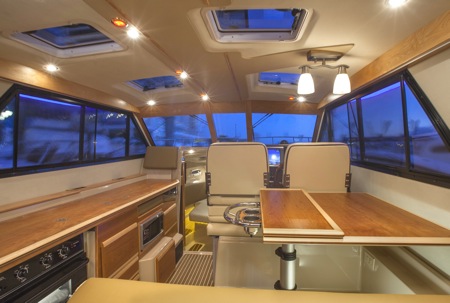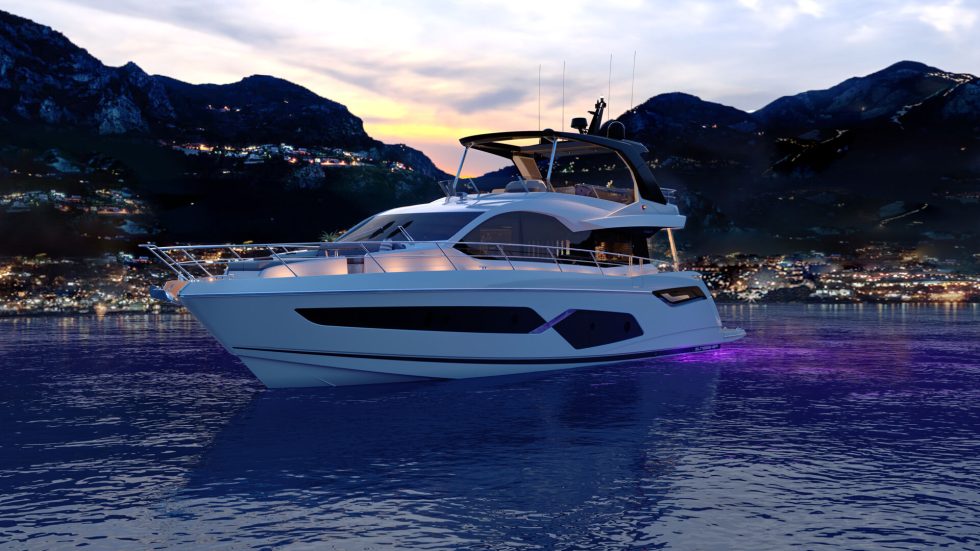The new Cutwater 30, from the same builder as Ranger Tug, solves a problem that plagues many small family cruisers — namely, the lack of adequate “social” and “moving around” space. It’s cleverly designed cockpit seating and foredeck table allow onboard guests plenty of room.
The 30 is a logical step up from the original Cutwaters of 26 and 28 feet. Their success — more than 90 of them sold since their introduction a couple of years ago — led naturally to the new 30.
The builder focused on the small cruiser overcrowding problem. Port and starboard cockpit bench seats, complete with backrests, cleverly fold out so the seat bottoms overhang the water. This allows traffic flow for other guests to easily move around in the cockpit. The transom seat can also be configured so those sitting on it can be facing fore or aft.
An opening panel in the aft cabin bulkhead allows two more guests to join the group in the cockpit if the aft settee seat back is tipped forward.
On the foredeck, two flush hatches hide a pair of cushioned seats, complete with a foot well that doubles as fender stowage with the hatches closed. The foredeck also is home to five-step, telescoping ladder over the bow for swimmers or beachcombers.
An all-glass door, six opening overhead hatches, a large windscreen and opening windows running from the windscreen to the aft cabin bulkhead flood the interior with natural light, and provide excellent visibility and ventilation.
The interior layout is traditional for vessels of this size, with a galley along the port side and a helm station and settee along the other, but the interior furniture is anything but traditional. A solid countertop runs from the aft cabin bulkhead to the forward cabin bulkhead. There is no stove or sink in sight. However, use of a clever double hinge system allows the countertop to swing back, revealing a standard propane stove, fridge and stainless-steel sink.

The dinette, convertible to a double berth, is located to starboard and seats four comfortably on each side of a high-low table. The solid wood tabletop is hinged, so that the port side can be laid back across the rest of the top. This opens up the area for seating and exposes a grab rail welded to the table center post.
Below the salon floor, under the settee, is a small but useable guest cabin containing a double berth, gear stowage space, reading light and two port lights. The forward stateroom features an island double berth, large hanging locker, plenty of storage and the vessel’s head, complete with a separate shower stall.
The 370-hp Volvo Penta D6 started quickly, without even a hint of smoke. Idle was 600 revs, and we made 3.5 knots and burned 0.4 gallons per hour (GPH). Our noise meter read 74 dB, just slightly above normal conversation. At a cruise of 2,500 RPM, our speed was 15.5 knots while burning 10 GPH. Wide-open throttle was 3,400 revs, and we stepped along at 26.3 knots while burning 20 GPH.
The new Cutwater 30 is a boat designed by boaters for boaters. It borrows features from its Ranger Tug stable mates, but wraps them up in a crisp, smartly styled, modern package. Its spacious deckhouse provides more than enough space for half a dozen people, and the clever aft deck seating arrangements means they won’t be stumbling over each other if they all decided to congregate in the cockpit.
The standard engine produces speed with good fuel economy. The boat handles well, responding quickly and precisely to all helm inputs at all speeds. Bow and stern thrusters make easy maneuvering even in the tightest marinas.
Any boater looking for a diesel-powered, 30-foot sedan cruiser should add the new Cutwater 30 to his or her “must see” list. www.cutwaterboats.com
Cutwater 30
Length Overall: 30 feet
Beam: 10 feet
Draft: 2 feet, 5 inches
Dry Weight: 10,200 pounds
Fuel Capacity: 180 gallons
Water Capacity: 80 gallons
Power: 370-hp Volvo Penta D6 diesel
Base Price: $279,937


